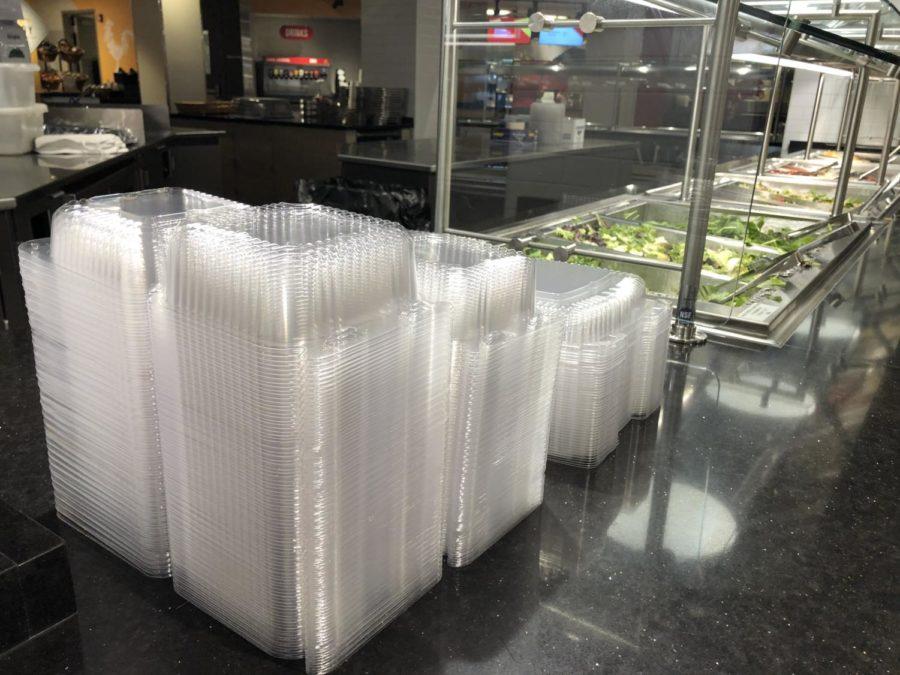Alternative plastic food packaging options possible for ISU Dining future
Katlyn Campbell/Iowa State Daily
Plastic containers used at the Memorial Union Food Court to store salads that students and faculty purchase. ISU Dining manager Karen Rodekamp hopes to find better packaging options to replace the use of plastic within the dining halls and food locations at Iowa State University.
October 9, 2018
Over the summer, many companies banned plastic straws from their businesses, and Iowa State University Dining staff members hope to reduce their plastic consumption by finding alternatives to plastic packaging within dining locations on campus.
Starbucks, McDonald’s (at it’s U.K. and Ireland locations), Alaska Airlines and the city of Seattle banned plastic straws altogether, according to National Geographic.
From an environmental standpoint, it takes 22 gallons of water to make one pound of plastic, according to the Water Footprint Calculator.
During the last academic year, ISU Dining took a step towards eliminating Iowa State’s plastic footprint by ending late night meals at Conversations dining.
14,850 pounds of plastic was saved by eliminating the late night meal option at Conversations, said Karen Rodekamp, ISU Dining manager.
Despite the effort to reduce plastic consumption and promote a healthier environment, students were not happy that the late night meal option was taken away from them, Rodekamp said.
One of the main reasons that plastic packaging is the go-to option at ISU Dining locations is because of the ease it allows when transporting food products across campus.
Sandwiches, salads and fruit cups sold in the ISU Dining cafés are made at a commissary located by Towers. The food must then be stacked on carts in a van and driven across campus before it reaches its final destination.
Merry Rankin, director of sustainability at Iowa State, said students want to be certain that their food won’t leak and will maintain its shape. The most alternative food packaging options – that are not plastic based – do not have a solid structure for housing salads, sandwiches and fruit.
Rodekamp said she thinks it is possible to switch from plastic containers to more environmentally friendly options, like wrapping sandwiches in paper or casing salads in cardboard boxes, but Iowa State students as well as her ISU Dining team has to be convinced the alternatives are going to work.
Rodekamp has also looked into compostable containers as an alternative to plastic packaging.
“Years ago, ISU Dining invested in a compostable container for all those yogurt parfaits… which was really great but still when they get into our consumer’s hands they were still going to the trash,” Rodekamp said.
Rankin said she thinks composting is an option for Iowa State, but still presents a few obstacles.
“Even if we had bins available there’s the consideration of where do we place the bins,” said Rankin. “How are they then picked up, who picks them up, who pays for them to be picked up?”
Rankin also said the Office of Sustainability is looking into the logistics of implementing compostable containers on campus for students.
“We have a compost facility but everybody that takes items to the compost facility pays to have items at that compost facility,” Rankin said.
Currently ISU Dining composts food within the dining centers but doesn’t have the funds to provide readily available compositing opportunities to students.
In order to interest students in composting, one suggestion Rankin has is to put signage on the food packaging items. Rankin said she believes more messaging would help students create a habit for composting.
“Now one thing that I think could be very beneficial is somewhere on the packaging having something that basically said ‘Don’t forget to compost me when you’re done, I’m compostable’,” Rankin said.
To reduce the plastic packaging on campus in the longterm, ISU Dining must find a food container that can transport efficiently, display the product appropriately and travel properly once in the hand of the customer, Rodekamp said.
“I think the biggest win or the easiest option would be if we could find a product that was manufactured in a green process,” Rodekamp said.
Last month Rodekamp presented on ISU Dining at the Midwest Food Recovery Summit in Des Moines and cited “review of packaging” as a future plan that she will continue to look into.

















